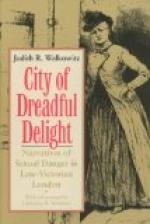It was a great plain, advancing by benches and slopes to the edge of a rocky shore. Without forests, spotted only with verdure, vast, barren, exhausted with the constant production of fourteen centuries, it was a cheerless sea-front at its best. To the west the wash of the tideless Mediterranean tumbled along an unindented coast; to the east the sallow stony earth went up and up, toward an ever receding sallow horizon. Between lay humbled towns, wholly abandoned to the bats and to the ignoble wild life of the Judean wilderness. There were no sheep or cattle. Vespasian had passed that way and required the flocks of the nation for the subsistence of his four legions. There were no olive or fig groves. They had been the first to fall under the Roman ax, for the policy of Roman warfare was that the first step in subduing a rebellious province was to starve it. The vineyards had suffered the same end. The enriched soil of these inclosures, made one now with the wild at the leveling of their hedges, produced acres of profitless weeds, green against the rising brown bosom of the hill-fronts. Here and there were the fallen walls of isolated homes—wastes of masonry already losing all domestic signs. There were no gardens; it had been two seasons since the wheat and the barley had been reaped last, and the seaboard of southern Judea, in the path of Rome the destroyer, was a wilderness.
Over all this immense slope the eyes of Costobarus wandered. However he had felt in the preceding days when he looked upon this ruin of the land of milk and honey, he realized now suddenly and in all its fearful actuality the predicament of Judea, its despair and the gigantic travail before those who would save it from the united sentence passed upon it by God and the powers. Immense dejection seized him. He looked from the face of the country, upon which not a single thing of profit showed, toward the bowed head and oppressed figure of his young and inexperienced daughter who was to put her tender self between Ruin and its victim. Chills, succeeded by flashes of fever, swept over him. He raised himself as if to give command to Aquila but settled back under the canopy, grown immeasurably older and feebler in that moment of helpless surrender to conditions of which he had been part an artificer. It was not as if he had made an incautious move in a political game; it was, as it seemed to him undeniably then, that he had advanced against the Lord God of Hosts, and there was no turning back!
He settled slowly into a stunned anguish that seemed to rise gradually, like a filling tide, shutting out the sunset and the seaboard, the bald earth and the streaming wind, and engulfing him in roaring darkness and intense cold.
They were in sight of a cluster of Syrian huts, the first inhabited village they had come upon since leaving Ascalon, but he was not aware of it. The sudden halting of his camel and a hoarse strained cry at hand seemed to bear some relation to his condition, but he did not care. He felt his howdah lurch to one side as some one leaped up beside him; he felt remotely the great grasp of hands on him, which must have been Momus’; the quick military voice of Aquila he heard and then, keen and distinct as a call upon him, the sound of Laodice’s tones made sharp with terror.




